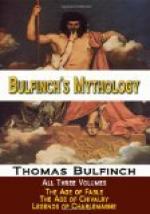THE ROUND TABLE
The famous enchanter, Merlin, had exerted all his skill in fabricating the Round Table. Of the seats which surrounded it he had constructed thirteen, in memory of the thirteen Apostles. Twelve of these seats only could be occupied, and they only by knights of the highest fame; the thirteenth represented the seat of the traitor Judas. It remained always empty. It was called the perilous seat, ever since a rash and haughty Saracen knight had dared to place himself in it, when the earth opened and swallowed him up.
“In our great hall there
stood a vacant chair,
Fashion’d by Merlin
ere he past away,
And carven with strange figures;
and in and out
The figures, like a serpent,
ran a scroll
Of letters in a tongue no
man could read
And Merlin call’d it
‘The Siege perilous,’
Perilous for good and ill;
‘for there,’ he said,
‘No man could sit but
he should lose himself.’”
—The Holy Grail.
A magic power wrote upon each seat the name of the knight who was entitled to sit in it. No one could succeed to a vacant seat unless he surpassed in valor and glorious deeds the knight who had occupied it before him; without this qualification he would be violently repelled by a hidden force. Thus proof was made of all those who presented themselves to replace any companions of the order who had fallen.
One of the principal seats, that of Moraunt of Ireland, had been vacant ten years, and his name still remained over it ever since the time when that distinguished champion fell beneath the sword of Sir Tristram. Arthur now took Tristram by the hand and led him to that seat. Immediately the most melodious sounds were heard, and exquisite perfumes filled the place; the name of Moraunt disappeared, and that of Tristram blazed forth in light. The rare modesty of Tristram had now to be subjected to a severe task; for the clerks charged with the duty of preserving the annals of the Round Table attended, and he was required by the law of his order to declare what feats of arms he had accomplished to entitle him to take that seat. This ceremony being ended, Tristram received the congratulations of all his companions. Sir Launcelot and Guenever took the occasion to speak to him of the fair Isoude, and to express their wish that some happy chance might bring her to the kingdom of Loegria.
While Tristram was thus honored and caressed at the court of King Arthur, the most gloomy and malignant jealousy harassed the soul of Mark. He could not look upon Isoude without remembering that she loved Tristram, and the good fortune of his nephew goaded him to thoughts of vengeance. He at last resolved to go disguised into the kingdom of Loegria, attack Tristram by stealth, and put him to death. He took with him two knights, brought up in his court, who he thought were devoted to him; and, not willing to leave Isoude behind, named two of her maidens to attend her, together with her faithful Brengwain, and made them accompany him.




